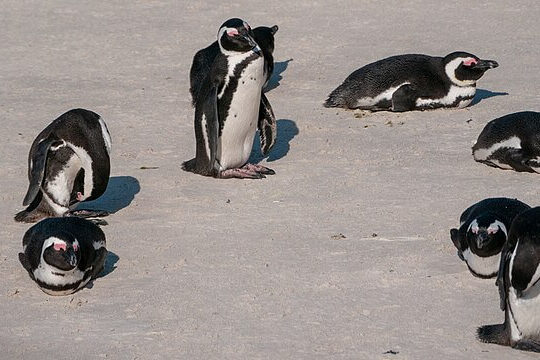
African penguins are rapidly disappearing, with their population declining by approximately 8% annually. These endearing birds, native to South Africa and Namibia, are facing a dire future.
Along the rocky shores of South Africa’s Betty’s Bay, penguins are seen hopping along the waterline and communicating with raspy barks. Despite their comical appearance, the situation is grave.
Dr. Alistair McInnes, a seabird conservationist for BirdLife South Africa, is deeply concerned.
“This one near the water is quite skinny. You can see it hasn’t got much fat on it.”
His team monitors the shrinking penguin colonies, observing firsthand the dramatic decline. Over the past century, the African penguin population has plummeted by 99%.
“If the current rates of decline persist into the near future we could see the extinction of the species within our lifetime by 2035, so the situation is extremely urgent,” Dr McInnes warns.
To address this crisis, BirdLife South Africa and the Southern African Foundation for the Conservation of Coastal Birds (Sanccob) have initiated legal action against the South African government. They argue that the government has failed to adequately protect this endangered species. This lawsuit is unprecedented in South Africa, marking a significant step in wildlife conservation efforts.
“We cannot let a species go extinct on our watch,” says Kate Handley from the Biodiversity Law Centre, which represents the groups. She adds that the government is constitutionally obliged to prevent such a scenario.
Currently, nearly all surviving African penguins reside in seven colonies along the south-western coast of Africa. The population is estimated at just 8,750 breeding pairs.
These penguins are a major tourist attraction, drawing visitors eager to see the short, stocky birds with distinctive black stripes. However, while they preen in the sun and guard their eggs, their existence is precarious. Natural predators, such as seals and certain gull species, pose a threat, but human activities are the primary danger.
Historically, the practice of harvesting guano—accumulated bird droppings used by penguins for burrowing—destroyed their habitat.
Climate change exacerbates the problem by causing storms and floods that endanger their colonies and altering ocean currents and temperatures, making it harder for penguins to find food. Additionally, the sardines and anchovies they depend on are heavily fished by commercial vessels.
The South African government has attempted to mitigate these issues by restricting purse seine fishing vessels, which use large nets to capture vast quantities of fish. Despite these efforts, penguin numbers continue to decline.
BirdLife South Africa and Sanccob argue that existing fishing closures are insufficient and improperly located to protect the penguin population effectively. Their legal team demands immediate implementation of “biologically meaningful” fishing restrictions.
In coastal communities, where fishing is a livelihood, these restrictions are contentious. Fishers argue that they are unfairly blamed and that existing restrictions have already caused significant economic hardship, costing millions of dollars and hundreds of jobs. Further restrictions, they warn, would exacerbate the situation.
“We’re a fraction of the problem,” says Shamera Daniels, deputy chair of the South African Pelagic Fishing Industry Association, which represents many of those fishermen.
“There’s predation – seals, sharks. We’ve got oil and gas exploration, noise pollution.”
A lengthy and potentially painful legal battle is anticipated. Conservation lawyer Ms. Handley acknowledges the gravity of taking legal action but stresses the urgency, as time is running out for the African penguin.
“Every incremental step towards trying to save the African penguin is something that we must undertake no matter how slim the chances may seem of actually getting this court hearing in time to actually have a biologically meaningful benefit for penguins,” she says.
The date for the first hearing is uncertain, and the South African government has yet to comment publicly on the case. However, many fear that it may already be too late to save this iconic species.
——————————————————————————
At Natural World Fund, we are passionate about rewilding the UK to stop the decline in our wildlife.
Donate now and join in the solution!

